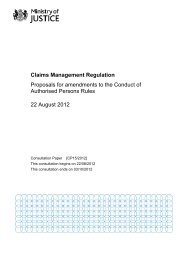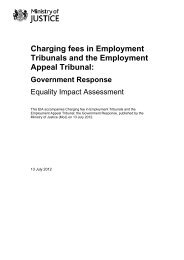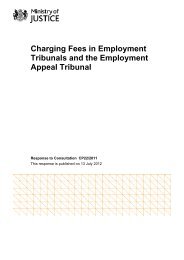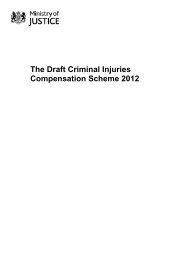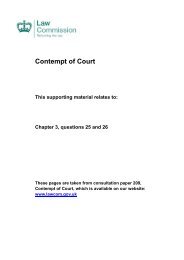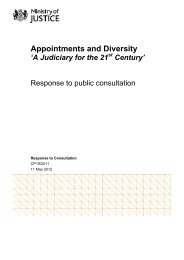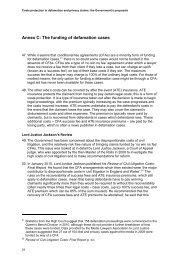Administrative Justice and Tribunals Council ... - Consultation Hub
Administrative Justice and Tribunals Council ... - Consultation Hub
Administrative Justice and Tribunals Council ... - Consultation Hub
Create successful ePaper yourself
Turn your PDF publications into a flip-book with our unique Google optimized e-Paper software.
<strong>Consultation</strong>: ‘Public Bodies Bill:<br />
Reforming the public bodies of the Ministry of <strong>Justice</strong>’<br />
RESPONSE OF THE AJTC<br />
What are your views on the proposed abolition of the AJTC<br />
The consultation paper states that “it is no longer an efficient or economic use of resources<br />
to have an independent advisory body to carry out functions in relation to administrative<br />
justice, tribunals <strong>and</strong> statutory inquiries.” It argues that a “a dedicated team of civil servants<br />
within the department’s <strong>Justice</strong> Policy Group are responsible for providing independent<br />
advice on strategic administrative justice policy” <strong>and</strong> that “most central government<br />
tribunals have now been brought into the <strong>Tribunals</strong> Service (now part of HMCTS)” <strong>and</strong><br />
“effective governance arrangements are now in place.”<br />
Of course the MoJ should have an administrative justice policy capability <strong>and</strong> we have<br />
noted the very recent appointments made to develop such a capability. However, we do not<br />
consider that there will ever be the necessary independence or capacity within the MoJ to<br />
replicate the functions of the AJTC. A policy function within government would not be able<br />
to provide “independent” advice to Ministers as the consultation paper claims. The Civil<br />
Service provides impartial advice but its role is to serve the government of the day <strong>and</strong> as<br />
such, “independent” advice from civil servants in a ministerial department is a constitutional<br />
impossibility. That is a major reason why Arm’s Length Bodies have come into existence<br />
historically, <strong>and</strong> also why it is not tenable to re-provide their functions within a government<br />
department in every case.<br />
As well the freedom to tackle issues where there is inevitably a direct conflict between<br />
government <strong>and</strong> the aggrieved citizen, the independence of the AJTC (<strong>and</strong>, earlier, the<br />
CoT) has enabled it to build distinctive continuity, expertise, experience, networks, insights,<br />
reputation <strong>and</strong> influence in ways which would be neither appropriate nor practicable for a<br />
government department. It is also noteworthy that in the areas of civil <strong>and</strong> family justice, the<br />
government has recognised the continuing need for independent arms-length advisory<br />
bodies; we have seen no convincing argument why a similar need does not also continue<br />
to exist in the field of administrative justice where the need for an independent body is<br />
greater.<br />
We will shortly publish a report setting out our analysis of the present state of the<br />
administrative justice system <strong>and</strong> outlining what we regard as the key elements of a<br />
strategic administrative justice policy. This report will challenge government to recognise<br />
the scale of unnecessary cost generated by its own actions. In particular, the report is<br />
critical of complex <strong>and</strong> badly drafted laws in some areas of administrative justice <strong>and</strong> about<br />
the extent to which poor decision-making in government departments is allowed to recur<br />
time <strong>and</strong> again without strategic action to improve it. It will also record our concerns about<br />
recent policy trends which create barriers to justice, including the reduction in legal aid, the<br />
introduction of fees <strong>and</strong> the unacceptable <strong>and</strong> growing delays in providing hearing dates for<br />
appeals. The report will emphasise:<br />
<br />
<br />
<br />
<br />
<br />
The need for good laws to underpin administrative justice;<br />
The need for public service decisions to be made right first time;<br />
The ongoing need for tribunal reform across the UK;<br />
The need for help, advice <strong>and</strong> representation in pursuing redress;<br />
Proportionate Dispute Resolution <strong>and</strong> wider strategic reform.



